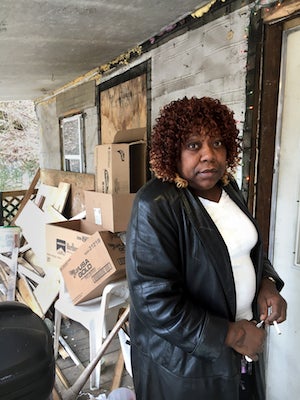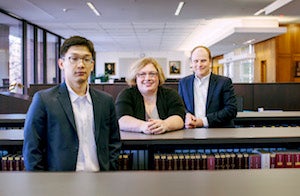FEATURES
Seeking Justice
After a Rural Kentucky Lawyer Wages a Massive Disabilities Scam, Law School Professor Laura McNally-Levine and Her Students Stepped up to Help Some of His Former Clients
 PHOTO: Barbara Brotman
PHOTO: Barbara BrotmanIris Tyler was getting by on disability benefits until she and hundreds of others became victims of their lawyer's fraud.
It's a six-hour drive and another world away from the Case Western Reserve University campus to Appalachian coal country. Poverty runs through eastern Kentucky like the dirt roads snaking deep into the hills.
But Laura McNally-Levine, JD, professor at the university's School of Law, and several of her students made that drive and entered that world when they became part of a volunteer legal army helping people in danger of losing their disability benefits in the wake of a massive Social Security fraud committed by their lawyer, Eric Conn.
Conn and two accomplices, an administrative law judge and a psychologist, received prison sentences. But Conn's former clients, even those with legitimate claims, faced their own sentence: the possible loss of their disability benefits—despite not being accused of committing fraud or even knowing about it.
McNally-Levine learned about the case in fall 2015 when a call for help went out to disability lawyers nationally to represent people seeking rehearings. She was appalled by the situation.
"They thought they were doing the right thing; they hired a lawyer. They followed what the lawyer said they needed to do," said McNally-Levine, who also directs the law school's Milton A. Kramer Law Clinic Center.
"I said: 'We do Social Security. Is there a way for us to do this?' " There was.
A PANIC-INDUCING SCAM
Conn, a flamboyant Kentucky lawyer who boasted on billboards that he was "Mr. Social Security," operated a years-long scheme in which he submitted false evidence of physical or mental disabilities, paid a psychologist and three other clinicians to sign forms, and bribed a Social Security judge to approve claims.
Before its discovery, the scheme had obligated the U.S. Social Security Administration (SSA) to pay $550 million in lifetime disability benefits.
Conn pleaded guilty in March 2017 to stealing from the SSA and paying illegal gratuities to the administrative law judge. He was ordered to pay $106.9 million in restitution.
While awaiting sentencing, Conn cut off his ankle-monitoring bracelet and fled the country. He was sentenced in absentia to 12 years. After six months on the run, he was captured in Honduras and is imprisoned and facing additional charges. The SSA judge in the scheme pleaded guilty to accepting $609,000 in bribes and was sentenced to four years. The psychologist was convicted on multiple counts, sentenced to 25 years and is appealing.
Separately, Conn's former clients were facing fallout from the fraud, which was the subject of national news reports and a 2013 U.S. Senate investigation.
The SSA is required to re-examine cases believed to be fraudulent, no matter who commits the fraud, a spokeswoman said. And so, in 2015, the agency notified 1,500 of Conn's former clients that their disability benefits would be reviewed—and that 900 of them, who had worked before going on disability, would have their benefits cut off immediately.
Panic spread through eastern Kentucky.
Many of them had legitimate cases, said Robert C. Johns, JD, executive director of the Appalachian Research and Defense Fund of Kentucky, known as AppalReD Legal Aid. "Whatever was done here was done without their knowledge," he said.
And they desperately needed the disability payments. "For most of these clients, this is their only income," said Kelly Ward-Wallen, JD, directing attorney at AppalReD's Prestonsburg, Kentucky, office. "What's at stake is their ability to maintain housing, provide for their families, provide shelter and clothing—the basic necessities of life."
When Iris Tyler got the SSA notification letter and learned her benefits would be terminated immediately, she was terrified.
A former hotel housekeeper who went on disability in 2008 because of back and knee pain and intellectual impairments, she was barely scraping by, even with her check. She lives in a cramped house on a dirt road with half-painted walls, unfinished floors and a
refrigerator and water heater standing outside. Tyler lives rent-free in exchange for fixing the place, but pain keeps her from doing so. When she needs water to wash or to flush a toilet, she has to go outside with a bucket to a garden hose hanging off the porch.
"I thought, 'What am I going to do?' " said Tyler, 63. "I wanted to take pills and die."
Robert Franks also faced an immediate cutoff. He had been a truck driver for 28 years, but then debilitating headaches he'd had for a decade became blinding. After blacking out a few times, Franks decided in 2009 to stop driving "before I kill somebody."
He had no idea what he would do without disability payments.
"That's all I had to live on," said Franks, 52, who has multiple sclerosis.
At least three people committed suicide after getting the letters. "This has been a real humanitarian crisis," said Ned Pillersdorf, JD, a Prestonsburg lawyer who took a lead in helping Conn's former clients.
After the first two suicides, U.S. Rep. Hal Rogers, whose district includes Prestonsburg, stepped in and the SSA decided to let people keep the benefits while they pursued rehearings. But they needed lawyers—and because of SSA rules on legal fees, ones willing to work for free, Pillersdorf and other lawyers said.
Pillersdorf took 70 cases, AppalReD nearly 200. But it wasn't nearly enough.
The Kentucky Bar Association helped recruit volunteers at its 2015 convention, while the National Organization of Social Security Claimants' Representatives, the professional group for lawyers in the field, emailed members asking for volunteers. Among them was McNally-Levine.
At the law school's health law clinic, she oversees students who represent people appealing disability-benefit cutoffs. It seemed ideal—a way to help people in eastern Kentucky, give her students valuable experience and expose them to a different place.
AN ARMY OF VOLUNTEERS
 PHOTO: Michael F. McElroy
PHOTO: Michael F. McElroyLaw students Alton Oh (left) and Holger Sonntag (right) and Professor Laura McNally-Levine traveled to rural Kentucky to represent people on disability whose lives were upended by their lawyer's scam.
McNally-Levine asked students if they'd be willing to take on cases for clients affected by the scam and living 370 miles away from the university. Four said yes.
"I'm from West Virginia, so it kind of tugged on my heartstrings," said Julia Kurtz, JD (LAW '16), then a third-year law student.
They took four cases, including those of Tyler and Franks.
Lawyers poured in from around the country—136 of them, enough to represent all 1,100 Conn clients who sought lawyers. The bar association held a training seminar at the University of Kentucky College of Law in Lexington led by experts—including McNally- Levine, who explained the basics of Social Security cases for volunteer lawyers who didn't practice disability law.
Kurtz, 27, was assigned to Tyler and drove to Prestonsburg to get to know the case. "She started crying," Kurtz said. "She got very emotional when she was talking about how she is limited. But she didn't want to take a break."
At the end of the meeting, Tyler hugged and thanked Kurtz.
But Kurtz graduated before the case moved forward. Holger Sonntag, a third-year law student, took over and drove to Prestonsburg with McNally-Levine for the hearing last fall.
They met with Tyler at a Long John Silver's. "We tried to explain to her, 'This is why we're here, this is what's going to be going on,' " said Sonntag, 48, a former minister who served two military tours in Afghanistan before law school. He got along so well with Tyler that when she couldn't pronounce his first name, she took to calling him "Ho Ho Cupcake."
At the hearing the next day, Sonntag argued that Tyler's physical and intellectual impairments had prevented her from working.
The judge asked her whether she had been able to do various specific tasks, Tyler recalled. "Then my Cupcake, he said, 'Well, your honor,' and he brought up everything I'm going through with my pain, my age, the years I worked," she said.
Meanwhile, Alton Oh, a 25-year-old third-year student, was representing Franks. He quickly encountered one of the highest hurdles in these cases: getting clients' old medical records.
They were needed because SSA required people to prove they were disabled at the time of their original applications, which had been made years earlier. But records were difficult to find. Doctors had died; medical offices had closed; and Conn, according to the 2013 Senate investigation, had arranged for the destruction of more than 26,000 pounds of documents.
That was the understanding lawyers had for nearly three years as they fought to maintain clients' benefits. Then in April came stunning news reports: Thousands of case documents remained at Conn's old office in long shelves stacked with boxes.
The discovery aroused fury among advocates. Without the files, "claimants were at a disadvantage" during their rehearings, Ward-Wallen said. "Those records may have made a difference" in proving years ago that people were legitimately disabled.
And medical records have been a thorny issue throughout the crisis. Social Security said from the start that any records involving health-care professionals who were part of the fraud were inadmissible.
"...[W]e must disregard evidence [in redetermination cases] if we have reason to believe that fraud or similar fault was involved in providing that evidence," said the SSA's Regional Communications Director Patti Patterson in an email earlier this year.
However, advocates for Conn's former clients say some of those records were of legitimate medical exams and that the SSA excluded them unfairly. That issue is now before an appeals court.
McNally-Levine had no reason to think Conn's files still existed when she and Oh drove to Hazard, Kentucky, last September for the rehearing for Franks, the former truck driver. Oh was nervous. "I presented the case, or I tried to," he said. "Laura stepped in many times to save me. She was the rock that held us together."
Franks, however, thought his young representative did beautifully. "Mr. Oh, he's great. Real thorough. He'll make a fine lawyer," Franks said.
At the hearing's end, the judge told Franks that although he couldn't say so formally, he had decided to award him full disability.
"I started to tear up," McNally-Levine said. "Then I look over at my client, and he's bawling."
"I couldn't hardly speak," Franks said. "That's all I had to live on. I believe I cried for 30 minutes."
Outside, Franks hugged McNally-Levine. Oh reached out for a handshake. " 'No, I'll hug you,' " Franks said.
HEARTRENDING LESSONS
 PHOTO: Barbara Brotman
PHOTO: Barbara BrotmanIris Tyler's eastern Kentucky home, where pain keeps her from making needed repairs and she has no running water.
The Franks case turned out to be their only win. The law school team lost two hearings that were held by three-way video hearings, with the client, lawyers and judge all in different cities. McNally-Levine hated the impersonal format, but the clients had waived their rights to in-person hearings.
And several months after Tyler's hearing, the judge ruled against her, determining that the evidence of the severity of her impairments did not meet the disability standards.
"I thought this was the [case] we had the best chance on," McNally-Levine said earlier this year. "To not be successful was very painful." However, because of her age and work history, Tyler now receives Social Security retirement benefits.
Many of the cases have been lost. SSA originally flagged 1,800 cases—1,500 that were reheard and 300 others that the agency determined after further investigation were legitimate. The SSA ruled against about 47 percent of the 1,800, while giving some 53 percent favorable or partially favorable decisions
McNally-Levine said the experience was valuable for the students. "We met a need, and the students got a good experience going in front of an administrative law judge, gathering evidence, writing a brief—the core things we want [them] to get out of a clinical program," she said.
But the lessons went beyond basic lawyering. "This was a case that allowed my students to see what happens when we as professionals act inappropriately—and the impact of that not only on individuals, but on a whole region," she said.
"As a law student, I got to go down to another state to interview a client on my own," said Kurtz, now a medical-malpractice defense attorney in Pittsburgh. "I got to work the case, I got to come up with the theory on it and I had to read all those medical records, which was really invaluable, especially since I do that now."
Oh said this was the first time a case became a person. "I didn't really feel it until we finally got there, when we went all the way down to Kentucky and saw Mr. Franks," he said.
For Sonntag, it was "a pretty stark reminder of what responsibility we have when we're dealing with our clients." A reminder, too, he said, that "there is a human being behind the paperwork; that people are not the case number ... and you as an advocate have the privilege, in a sense, of following for a few weeks or a few months and trying to help them out."
McNally-Levine and a new group of students could soon take on more cases slated for rehearings.
The SSA's Office of the Inspector General has flagged nearly 2,000 more Conn-connected cases containing potentially fraudulent claims.
McNally-Levine said it's not clear who will sift through the thousands of documents in Conn's old office—or when. But the big questions now, she said, are how to address the cases of the 800 people who lost their rehearings and how to pause the new cases until lawyers gain access to those files. "If there are files in that mess that have [our clients'] names on them, I want to see them," she said.
Sonntag has finished work on Tyler's case. When he graduates, he plans to send her a fitting farewell: a package of Hostess Ho Hos.





